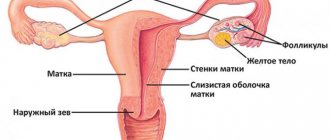The female body reacts sharply to changes. Delayed periods due to climate change are not uncommon. This phenomenon occurs frequently and does not require treatment. The body needs some time to get used to new conditions. When the climate changes, menstruation comes both earlier and later. Consult a doctor if problems persist for a long time or are accompanied by negative symptoms. You need to track your cycle using a calendar. It is necessary to regularly mark the days when your period occurred. In the future, this will help to monitor the duration of the female cycle and detect irregularities in time.
Delayed menstruation can be due to various reasons:
What is acclimatization and what is its effect on the body?
Acclimatization is a term that refers to the body’s adaptation to conditions that have changed. This may be required when changing temperature conditions, humidity levels, time zones, etc. The body's reaction to these factors varies from person to person.
The reproductive system is the most sensitive. That is why she is usually the first to react to changing conditions. There is a high risk of changes in the duration of the menstrual cycle. Your periods may shift slightly.
Acclimatization affects not only menstruation. Often against this background there is an exacerbation of existing diseases. There is also a high risk of developing cold symptoms.
People with cardiovascular diseases suffer the most. There is a possibility of sudden jumps in blood pressure. Hypertensive patients with climate change are at risk of a hypertensive crisis. If your health deteriorates significantly, seek help from a doctor.
Symptoms of acclimatization may be similar to a cold. The reaction to changing environmental conditions is normal for women of all age groups.
Doctors recommend monitoring your health most carefully after changing your place of residence if you have:
- cardiovascular diseases;
Girls with heart disease are at risk
- pathologies of the musculoskeletal system;
- chronic diseases of the lungs and bronchi.
Based on the listed factors, it can be noted that acclimatization is most dangerous for women who are experiencing menopause.
Advice from a gynecologist
During the summer heat, it is necessary to be especially careful about maintaining personal hygiene. Firstly, the woman’s immune system is weakened, and secondly, an open cervix does not prevent the penetration of infection, and increased ambient temperature promotes the development of microbes. Therefore, it is important to listen to the following tips:
- You need to wash yourself twice a day. This must be done correctly - from front to back.
- Change hygiene products on time. Pads - every 2-3 hours, tampons - according to instructions, frequent changes can lead to the development of toxic shock.
- It’s worth stopping visiting the beach and pool for a while.
- Do not take a hot bath, only shower.
- Do not use synthetic underwear.
If you adhere to these basic rules, you can feel confident even on critical days and not be afraid of unpleasant consequences.
What is the menstrual cycle
The menstrual cycle is a complex of cyclical changes in the female body. All of them occur under the influence of hormones. Aimed at preparing a woman for the likely conception and bearing of a child.
The main characteristics of a normal cycle are presented in the table.
| Duration | The average duration of the menstrual cycle is 28 days. Under the influence of individual factors, this period may be shorter or longer. |
| Ovulation | Occurs in the middle of the menstrual cycle. It is characterized by the release of a prepared egg towards sperm. Ovulation usually begins on days 13-16 of the cycle. It is at this time that a woman is ready for fertilization. |
| Discharge | During the intermenstrual period, a woman secretes secretory fluid. Necessary to protect the uterus from infections. The color of the discharge is transparent, white or cream. There is no foreign smell. |
The cycle begins to count from the first day of menstruation. In order to calculate the duration of the female period, you should mark the days on which the woman menstruated on the calendar.
On average, the cycle lasts 28 days
Menstruation first begins during adolescence and is called menarche. At first the cycle will be unstable. Formation will occur only after a year. It is after this that critical days will become regular.
Menstruation disappears on average at 45-50 years of age. It is by this time that the supply of active eggs ends. Under the influence of hormones, menopause is formed, and the woman loses the ability to bear children. The body is actively aging.
During menstruation, the endometrial layer is renewed. Menstruation begins only if fertilization has not taken place.
Scanty periods in hot weather
With a large temperature difference, various changes occur in the body. A person begins to sweat heavily, which cools the body, so dehydration may begin. Other symptoms are also observed - mood changes, irritation and insomnia. At the same time, the body experiences severe stress, which will most likely affect the critical days: they may be delayed or be completely scarce.
Other reasons include:
- anorexia – physical exhaustion often leads to decreased discharge during menstruation and other pathologies;
- anemia;
- infectious diseases;
- injuries and operations of the pelvic organs;
- uncontrolled use of hormonal contraceptives;
- tumor processes of the genitourinary system;
- endocrine diseases.
Scanty menstrual flow is characterized by a significant decrease in volume to a few drops or even just a brown or dark red smudge. May be accompanied by dizziness, lower back pain, and spastic contractions of the uterus.
What are the causes of cycle disruption?
The female body is especially sensitive to any changes that occur. As a result, the girl has to periodically deal with menstrual irregularities.
When eating fatty and fried foods, disruptions in the cycle are possible
Under the influence of external factors, a delay in menstruation can be either 5-7 days or several months. Violation occurs as a result of:
- hypothermia;
- the presence of various diseases;
- poor nutrition;
- presence of bad habits;
- excessive physical activity;
- lack of sleep;
- stressful situations;
- starting to take various medications, etc.
Only a gynecologist can determine the true cause of the failure.
What is considered normal
The menstrual cycle may be interrupted 1-2 times during the year, and this is not considered a pathology. Just like cycles without ovulation, when the egg does not mature. If after the sea there is a delay in menstruation and the test is negative, then this may be a functional disorder associated with a change in lifestyle.
After a holiday at sea, menstruation is allowed to fail for a period of time equal to a full cycle, up to approximately 35 days. If recovery has not occurred and there is no pregnancy, then this is a reason to consult a gynecologist.
Could there be a delay with climate change?
Climate change is the most common cause of cycle disruptions. A sudden change in conditions can provoke:
- nausea;
- irritability;
- drowsiness;
- weakness;
- headache.
When climate changes, nausea is a common phenomenon.
All of the above signs indicate that it is difficult for the body to adapt to new conditions. The duration of acclimatization is usually several days. After this, health is restored.
Getting used to the climate can take longer if a woman has any chronic pathologies. In this case, normalization takes up to two weeks. In this case, menstruation may come either later or earlier.
It is impossible to predict in advance how the new climate will affect the performance of the body, including the reproductive system. Even if new conditions are familiar, one should not exclude the influence of heat, increased physical activity and stress. This also affects the cycle.
Delayed periods after the sea
Vacation is an event that many people look forward to almost the whole year.
And having finally achieved what we want, our body plunges into a sea of pleasant stress (literally and figuratively) - climate change, sometimes dramatic, increased physical activity, delicious food and much more pleasant things.
But often women begin to worry and look for a reason when their periods are delayed after the sea. What is this - an unexpected pregnancy or an uncharacteristic failure? What to do and how to solve the problem?
Read in this article
Reasons for failure
The menstrual cycle is a very delicate system, the cyclicity of which is ensured by sex hormones, as well as other biologically active substances. The frequency of the onset of menstrual periods depends not only on ovulation and the degree of growth of the endometrium, but also on the season of the year, the woman’s psychological comfort, her relaxation and not being bothered by everyday problems.
When going on vacation to the sea, we radically change our usual way of life, “shake up” the body and all systems. It is not in vain that couples who are unsuccessfully planning children are recommended to travel to warm countries. Such a shake-up reconfigures all mechanisms and connections, including the organs of the reproductive system.
During or after a holiday at sea, the cycle can either be shortened or extended. It depends on whether the trip will take place in the first or second phase. What objective reasons and arguments can be given?
Phases of the normal menstrual cycle
Moving
Often the transport you have to use to get to the place is inconvenient, or you have to wait in queues for many hours, or sit through time when plane flights are delayed. Traveling at night saves us hours for rest, but this is not a very pleasant thing for the body.
During such travel, the production of melatonin, which is responsible for good sleep and well-being in the morning, is disrupted. As a result, the work of the pituitary gland and hypothalamus is disrupted, which, among other things, regulate the production of luteinizing (LH) and follicle-stimulating (FSH) hormones, which are responsible for the maturation and release of the egg, and during the onset of menstruation.
Often the move takes more than one day, for example, if you travel by train or car.
Climate change
Even without going anywhere, women can experience disruptions in their menstrual cycle when the seasons change, especially summer-autumn and winter-spring.
This is primarily due to the temperature difference - the body “reconfigures itself” to a time favorable for conception, and vice versa.
When a woman decides to enjoy the sun of Egypt in the midst of a winter blizzard, this cannot but affect her hormonal levels, and as a result - a delay in her period after a trip to the sea.
Length of day
Increasing or decreasing the amount of daylight also matters. The biological clock of any person is adjusted precisely to this parameter. As a rule, when arriving at the seaside, women spend most of the day outside the hotel: basking in the sun or cooling off in the water.
Diet
During such holidays, the diet also changes. Often in the office or during hectic work, you don’t have enough energy and there is no way to make not only a full lunch, but even a snack. And on vacation you often expect an all-inclusive program and five to six meals a day.
This is where my soul takes off and I want to try everything. There is both benefit and harm in this. Such variety and quantity of food, especially fresh fish, fruits and vegetables, provide the body with the daily requirement of all vitamins and microelements.
But after overeating comes several hated kilograms.
Sufficient consumption of seafood provides a woman with the necessary amount of iodine, which affects the function of the thyroid gland. And she is the “conductor” of our body, influencing both the ovulation process and the condition of the mammary glands.
Physical exercise
Some women, after routine office work, choose an active form of recreation. And on a regular tour, the curious will find many excursions and fun pastimes.
Unusual physical activity contributes to the release of large amounts of adrenaline, dopamine and even oxytocin, which, through the hypothalamic-pituitary connections, affect the maturation of follicles in the ovary and the onset of menstruation.
Regular sex
During everyday work, you may no longer have the energy and time to have an intimate relationship with your beloved man. Especially if there are small children at home. How many women are single? Vacations provide plenty of opportunities for regular sexual intercourse.
And some single women see only this as all the delights of traveling at sea. Sex is a release of hormones of “happiness and joy”; oxytocin is released after every pleasant touch of another person to the girl’s skin.
Often, without even leaving, a woman notes that with an active sexual life, periods become more regular and less painful. And in the absence of intimate life, the opposite is true.
Psycho-emotional calm
The stress that haunts us everywhere in everyday life, worries and family dramas - all this leaves an imprint on the state of a woman’s nervous system and on the menstrual cycle. After all, the regulation of hormone production occurs “on command” from the brain.
Often on vacation a woman drinks more alcohol than in normal life, and it is known to relax, unwind and calm in small doses.
Taking hormonal medications
Sometimes during a holiday at sea you have to use emergency contraception. 50% of women experience menstrual irregularities after taking these pills. This can be either a delay in menstruation after a vacation at sea, or the appearance of discharge immediately after taking the medicine - it all depends on what phase of the cycle the drug was used in.
Women who have any diseases of the reproductive system (this is more true for submucous fibroids and endometrial pathologies, including polyps), especially in premenopausal age, should be more wary, since such changes in lifestyle for a short time can cause abnormal bleeding or excessively heavy menstruation.
We recommend reading the article about how to swim in the sea during your period. From it you will learn about doctors’ opinions on swimming during menstrual periods, possible options for visiting bodies of water, as well as practical advice.
Solution
The premature appearance of spotting or a delay in menstruation at sea should, of course, alarm a woman, but there is no need to worry too much about this. As a rule, a small functional failure normalizes as soon as everything returns to the usual way of life. Here is what is recommended to do in case of such violations:
- First of all, take a pregnancy test. But over a short period of time, it cannot always show a reliable result, so it is better to take a blood test for hCG. You can carry out all this research at home, unless, of course, your vacation extends over two to three months.
- It is useful to take an additional course of vitamins after rest. There are many complexes aimed at normalizing menstrual function. One of the drugs that, despite its relatively recent appearance, has already proven its effectiveness and efficiency is Time Factor. You can also take folic acid, vitamin A and E separately.
- Continue to lead as healthy a lifestyle as possible with sufficient physical activity and proper nutrition.
Source: https://psyfisis.ru/posle-morja-zaderzhka-mesjachnyh/
Is there a delay after the flight?
Flights are accompanied by disturbances in the circadian cycle. For the female body this is real stress. However, car travel also has a negative impact.
The disturbances are especially noticeable in women who for the first time chose to fly. In this case, the disruption of the cycle will be associated not only with disturbances in the circadian cycle, but also with the stress and experiences experienced.
In this video you will find the most common causes of menstruation failure:
How to help your body if your period is late after a vacation?
There are general recommendations that, if followed, help the female body recover faster after rest. A delay in menstruation may be minimal or not occur at all if:
- Prepare for your trip in advance. If you systematically go to bed an hour earlier or later a week before your upcoming flight (for air travel to the east and west, respectively), you can reduce the risk of possible menstrual irregularities.
- Eat properly. It is not recommended to follow strict diets at this time, especially those limiting fat intake. Food should be higher in calories than usual, but at the same time healthy and balanced. Doctors also advise abstaining from drinking alcohol.
- Maintain drinking regime. It is advisable to drink at least 1.5 liters of purified water per day and additionally drink herbal infusions, tea, and freshly squeezed juices.
- Take vitamin and mineral complexes. The use of substances beneficial to the body helps to minimize the manifestations of acclimatization and reduce the risk of menstrual cycle disruptions.
- Perform moderate physical activity. Yoga, Pilates, and stretching are ideal for this purpose.
- Sleep at least 8 hours a day. Adequate rest is the key to a speedy recovery of the body, so while on vacation and after returning home, try to devote enough time to sleep.
- Spend more time outdoors and try to be less nervous.
Diet for delayed menstruation
In addition to these simple recommendations, the normalization of the disturbed menstrual cycle is well facilitated by taking evening primrose oil “Gynocomfort”. This remedy not only helps to adjust the erratic monthly cycle, but also eliminates the unpleasant sensations caused by this disorder - engorgement and soreness of the mammary glands, pain in the lower abdomen, irritability and nervousness. In addition, evening primrose oil increases the body's defenses, helps fight inflammation and has antioxidant properties.
When to see a doctor
It is necessary to contact a doctor if the delay is prolonged. The prolonged absence of menstruation is due to existing pathologies, and not to changes in living conditions.
To determine the cause of the disorder, the woman will be referred for diagnostics. You will need to go through:
- gynecological examination;
- blood analysis;
- Analysis of urine;
- Ultrasound.
Before visiting the doctor, you will need to take a pregnancy test. The delay is probably due to successful fertilization.
Causes of delayed menstruation
The move itself can lead to a delay in menstruation after a trip to the sea. Often moving from one city to another, transfer to the airport is planned for the night, in order to save time on vacation. Sleeping in an uncomfortable position on a bus cannot be called complete, and some people prefer to give it up altogether. Melatonin, which is produced during sleep, indirectly affects the synthesis of sex hormones. Staying awake during the move disrupts the cyclical production of hormones, as a result - there are no periods after the vacation.
In the case of a holiday at sea, a sharp change in climate , if the holiday was planned in a climatic zone different from the place of residence. Flying from winter to hot summer, changing time zones with a significant time shift, or vacationing in the opposite hemisphere are extremely stressful. Returning home to familiar conditions after 10-14 days serves as a new shake-up for the body.
Don't forget about changing your diet . A trip to a hotel where meals are provided in the form of an all-inclusive buffet opens up a large number of temptations. It is very difficult to limit yourself when there are so many delicious dishes in front of your eyes. Many women note that after vacation they add a few extra pounds. Adipose tissue is hormonally active, so its increase can lead to missed periods after the sea.
Increased physical activity can also lead to delayed menstruation. If a girl does not train for a year, is busy with a sedentary job, and during the holiday period she can go on a long hike, swims and moves a lot, then the reproductive system will react with a disruption of the menstrual cycle.
Holidays at sea, especially for single women, become a period of new sexual acquaintances and connections. Regular sex life during vacation and its absence after can lead to changes in the cycle.
Emergency contraception , which is used after unprotected sexual intercourse, can disrupt the menstrual cycle Postinor and Escapel are drugs with a high dose of the hormone and disrupt the normal cycle. Therefore, they are not recommended to be used more than once within one cycle; they can lead to acyclic uterine bleeding and cycle failure.
Women who are protected with combined oral contraceptives sometimes forget to take the pill on time and mess up their own schedule. Therefore, a delay in menstruation at sea is natural.
The reason for a delay in menstruation after a vacation may be trivial - a sexually transmitted infection that was transmitted after unprotected sex. On vacation, even with your loved one, do not forget about contraception. A condom is the most effective method of preventing STIs. Those who do not like the sensation of using it are recommended to use spermicidal agents that protect against infectious pathogens and unwanted pregnancy.
The end of the holiday season leads to an increase in sales of pregnancy tests. Some women, relaxing at sea, manage to get pregnant there. Therefore, if your period does not come after a vacation, you can suspect pregnancy .
Sometimes women cannot get pregnant for several years, undergo various treatments, but still do not achieve any results. Sometimes such a shock in the form of long-distance flights to overseas countries with a different climate, stress, although positive, has a beneficial effect on a woman’s body and “reboots” reproductive functions; after a vacation, an unexpected and long-awaited pregnancy can occur.
How to restore a cycle
To restore the cycle upon returning home, you need to give up excessive physical activity.
It’s better not to go straight to work, but to rest for 2-3 days. Nutrition at this time must be balanced and contain as many vitamins as possible. Read also: what vitamins are recommended to restore your cycle.
It is recommended to take vitamins.
Do not try to eliminate the disorder yourself if you have the following manifestations:
- itching and burning in the genitals;
- pain in the lower abdomen;
- fishy smell in the discharge.
The listed symptoms indicate the development of an infectious process, which requires mandatory consultation with the attending physician.
To restore your cycle, it is important to follow a daily routine. It is better to go to bed at the same time. Hiking in the fresh air will also be useful. Taking medications at your own discretion is strictly prohibited.
Delayed menstruation after sea
The menstrual cycle is a fragile system, the functionality of which depends on the production of the proper level of hormones and other biological substances. Normally, the duration of the female period is stable, repeats regularly and has the same duration, falling within the range of 21-35 days.
Often representatives of the fairer sex are faced with the fact that their periods are delayed after the sea. Such cases are not isolated and do not necessarily indicate pregnancy. Although this fact cannot be ruled out if there was sexual intercourse during the holiday.
Causes
To the question of whether there can be a delay in menstruation after the sea, the answer is yes. Specialists, gynecologists and women themselves say that this happens often. The reasons for this condition can be very different and unexpected. All of them are divided into pathological and physiological.
Due to physiological processes and natural changes in the functioning of the body that occur during vacation, the menstrual cycle does not delay for long. Bleeding usually begins within the next week and subsequently regains its regularity.
When pathology develops during vacation, the delay can be long. It is often accompanied by other disturbing signs, for example, abdominal pain, increased body temperature, and local enlargement of the lymph nodes. If these symptoms are observed after vacation, then you should definitely make an appointment with a gynecologist.
Loads
The priorities of office workers who lead a sedentary lifestyle are often ski resorts, traveling with excursions and playing sports.
A sharp change in activity leads to the release of dopamine, adrenaline and oxytocin. These substances regulate the relationship between the hypothalamic-pituitary-ovarian system.
As a result, a woman may not only have her cycle disrupted, but also have two ovulations in a row.
Sex
Lack of regular sexual intercourse can lead to longer cycles and no ovulation. During travel, a woman usually has regular contact. This process can cause the egg to mature later than it should have. As a result, there will be a delay in menstruation exactly as long as ovulation shifts.
Pregnancy
There is often a delay after the sea - reviews from women say - due to pregnancy. It happens that a couple has been planning conception for a long time, but nothing works out for them. Numerous examinations show that the partners are healthy and compatible, but they cannot achieve their goal.
Having gone on vacation together, a man and a woman change the situation. They forget about routine and throw all problems out of their heads. At this time, the long-awaited conception occurs.
Medical practice has documented many cases where an infertile couple managed to conceive a child while on vacation.
If menstruation does not come after the sea for 2 weeks or more, then this is a reason to take a pregnancy test and donate blood for hCG.
Infections
If there is a delay and the test is negative, then this condition may indicate an infection or inflammatory process that occurs in the pelvic cavity. (Adnexitis, endometritis)
A single woman may have casual sex during her vacation. If you do not use barrier contraception, there is a high probability of contracting a sexually transmitted disease. Inflammation is often accompanied not only by cycle disruption, but also by the appearance of pain in the lower abdomen, as well as strange discharge with an unpleasant odor.
If there is a chronic inflammatory process in the pelvic cavity, it can worsen, for example, due to hypothermia at sea and a decrease in local immunity.
To avoid such consequences, it is recommended to wipe yourself dry after swimming and change into clean underwear.
If at the time of the trip there were already inflammations, vaginitis or vaginosis, then all this may worsen, causing a delay in the menstrual cycle.
Recommendations
If the delay after the holiday is only a few days, then you should take a pregnancy test. If you receive a negative result, you can wait another 1-2 weeks. In most cases, the cycle recovers on its own.
If there are concerns or additional worrying signs appear, it is better to seek help from a gynecologist. To save time, you can do a pelvic ultrasound yourself and only then go to the doctor.
Following simple recommendations will help you avoid a missed period after a vacation at sea.
- Prepare for jet lag. In the week before your trip, you should gradually shift your bedtime and wake-up time according to your expected schedule.
- Set up nutrition. It is worth consuming healthy foods rich in proteins and fats, and keeping fast carbohydrates to a minimum. If you give up on-the-go snacks, fast food, and eliminate alcohol, it will be easier for your body to tolerate a change in diet. Use vitamin complexes. To prevent the body from being shocked by the abundance of new fruits, vegetables, juices and other vitamin dishes, you should start replenishing the missing reserves at home.
- Maintain psycho-emotional calm. There is no need to be nervous before your trip. If necessary, you can take soothing herbal remedies, such as valerian or motherwort.
To ensure that your menstrual cycle does not go astray and your period comes on time after vacation, you can use oral contraceptives. The tablets will allow you to adjust the bleeding time as needed by the woman. It is important to use such medications only as prescribed by a doctor.
: Delay of menstruation. Menstrual irregularities, menstrual cycle irregularities
Source: https://uterus2.ru/disease/menstrual-irregularities/zaderzhka-mesyachnyh-posle-morya.html










